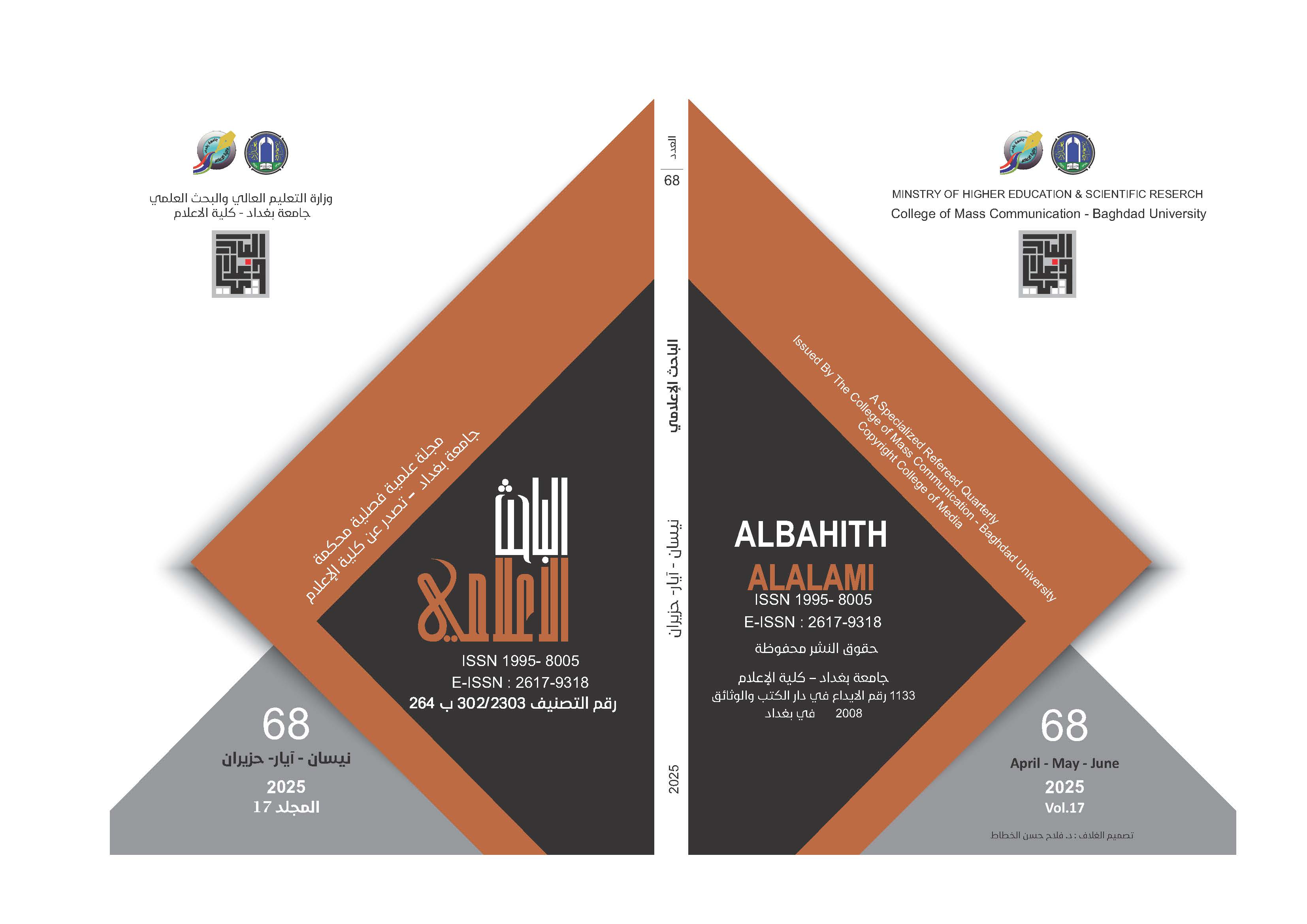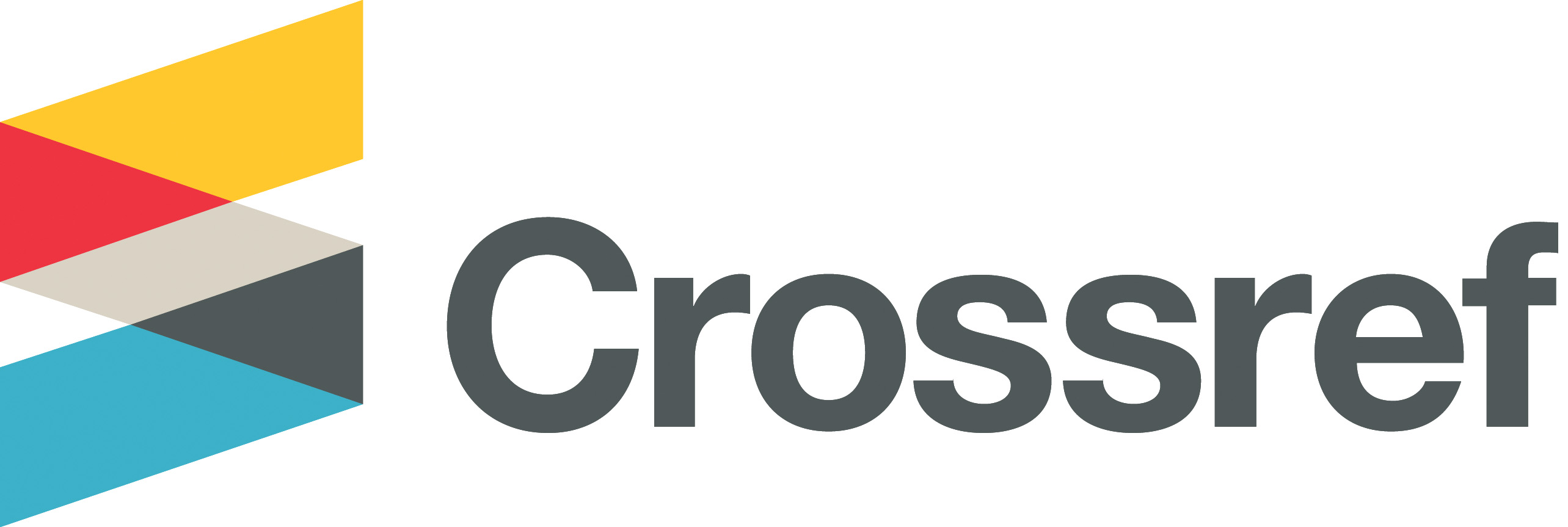The Dependence of Iraqi Radio Stations on Social Media Applications as a Source of Information
A Field Study
DOI:
https://doi.org/10.33282/abaa.v17i68.1078Keywords:
Iraqi Radio Stations, Social Media Platforms, News Sources, Media Credibility, Content VerificationAbstract
Objectives: This study aims to determine the extent to which Iraqi radio professionals rely on social media platforms as sources of information, identify the most widely used platforms among media personnel, assess the perceived credibility of content published on these platforms, and measure the level of trust in information that includes audio or visual content shared through social media.
Methodology: The study adopted a descriptive-analytical methodology, specifically using a field survey approach through a questionnaire designed to meet the research objectives. Additionally, personal interviews were conducted with a purposive sample of 100 communication professionals working in the newsrooms of six major Iraqi radio stations. Data were collected from December 27, 2022, to February 13, 2023, considering the geographical, temporal, and functional distribution of the respondents.
Results: The results indicated that Iraqi radio professionals rely moderately on social media as an information source. Telegram ranked first among the most used platforms due to its publishing freedom and ease of video sharing, especially in covering breaking news. Respondents preferred information accompanied by visual or audio content to enhance trust and credibility. Levels of trust varied across platforms, with WhatsApp gaining the highest trust, while Viber ranked lowest.
Conclusion: The study confirms that social media has become a primary information source for Iraqi radio stations in the age of digital media. However, professional use of these platforms still requires caution, particularly regarding the verification of content accuracy. The study recommends enhancing digital verification skills among journalists and updating editorial policies to effectively integrate traditional and digital sources.
Downloads
References
Abdel Aziz, B., & Mawaad, M. (2000). Radio and Television News. Cairo: Dar Al-Kitab Al-Hadith.
Abdul Hadi, A. M., & Almaeeni, M. S. (2023). The uses of social networking applications and websites in promoting the gulf stock markets. ALBAHITH ALALAMI, 15(59), 23-44. https://doi.org/10.33282/abaa.v15i59.948
Abdul Razzak, R. M. (2013). The Role of Social Media Sites in forming the Political Consciousness: Case Study on the popular movement in Iraq during the period of 1-3-2013 to 1-6-2013 in applicant on students in the University of Mosul, Anbar and Tikrit [Master's Thesis, UNIVERSITY OF PETRA]. https://bit.ly/3Z7wsET
Ahmed, G. M. S. (2004). Design and Implementation of Social Research. Alexandria: Dar Al-Maaref Al-Jamiiya.
Al-Hamdani, A. A. R. M. (2021). News Coverage of Arab Events and Issues on Radio Monte Carlo (France) and China Radio International Broadcasts in Arabic. [Unpublished Master's Thesis, University of Baghdad].
Al-Kaabi, R. J. (2018). A Guide to Research on Radio and Television Audiences. Baghdad: Dar Al-Jazeera for Printing and Publishing.
Al-Khafaji, A. N. N. (2014). The News Function of Social Networks from the Point of View of Iraqi Journalists: Applied Study [Master's Thesis, Middle East University]. https://bit.ly/4jS9D0y
Al-Maqdadi, K. G. Y. (2013). Social Networks Revolution: The Nature of Social Media and Its Dimensions. Amman: Dar Al-Nafaes for Publishing and Distribution.
Al-Mashhadani, S. S., & Al-Obaidi, F. H. (2020). Social Media and the Characteristics of the New Media Environment. Amman: Dar Amjad for Publishing and Distribution House.
Al-Musawi, H. A. N. (2021). Advanced Rules in Editing Radio and Television News. Amman:Dar Amjad for Publishing and Distribution.
al-Rawi, B. J. (2012). The Role of Social Media in Changing Media. ALBAHITH ALALAMI, 4(18), 94-112. https://doi.org/10.33282/abaa.v4i18.793
Al-Saou, S. (2017). Information about Telegram. Mawdoo. https://2u.pw/xjOMpO
Al-Shamaileh, M. O., Al-Lahham, M. E., & Kafi, M. Y. (2015). New Digital Media. Amman: Dar Al-Ihsar for Publishing and Distribution.
Alewe, A. A. (2017). Satellite News Channels Coverage of Mosul Liberation operations: An analytical study about news in Al Jazeera & Al Myadeen Channels From 17-10-2016 to 14-01-2017 [Master's Thesis, University of Baghdad]. https://studies.aljazeera.net/ar/article/5707
Ali, H. K. (2022). The Dependence of Iraqi Satellite Channels on Social Media as a Source of News. [Unpublished Master's Thesis, University of Baghdad].
Ameen, R. (2015). New Media. Bahrain: Dar Al-Fajr for Publishing and Distribution House.
Basha, H. S., & Basha, M. H. S. (2020). Social Media: A Journey into the Depths. Damascus: Dar Al-Qalam.
Ben Azzah, F. Z. (2017). Local Radio and Its Role in Shaping Public Opinion: A Case Study of Western Algerian Radio Stations. [Doctoral Dissertation, University of Abou Bekr Belkaid]. http://dspace.univ-tlemcen.dz/handle/112/12315
Haffar, A. N. (2022). The Impact of TikTok Application on the Individual and Social Practices of Its Adolescent Users: A Field Study on a Sample of Students from El-Hadi Khediri High School, Tebessa. [Unpublished Master's Thesis, Echahid Cheikh Larbi Tebessi University].
Hijab, M. M. (2003). The Media Encyclopedia. Cairo:Dar Al-Fajr for Printing, Publishing, and Distribution.
Ibrahim, Y. K., & Hussein, W. M. A. (2015). Mechanisms of Social Change in the Era of Digital Communication and its Effects on the Communicative Message. ALBAHITH ALALAMI, 7(29), 50-70. https://doi.org/10.33282/abaa.v7i29.184
Ismael, B. J. (2012). Introduction to New Media: Concepts and Models. ALBAHITH ALALAMI, 3(14), 9-25. https://iasj.rdd.edu.iq/journals/uploads/2025/03/06/e3585a3774faa1e2ed8123c6927420c9.pdf
Jiyad, G. K. (2013). The Role of Television in Shaping Public Opinion Regarding Provincial Councils. [Unpublished Master's Thesis, University of Baghdad].
Nabih, A. (2019). Digital Communication and New Media: Facebook as a Model. Amman: Dar Ghaidaa for Publishing and Distribution.
Sahbi, S., & Khalafa, Z. (2018). Algerian youth's attitudes towards news sources between traditional media and new media: A field study on a sample of students of Larbi Ben M'hidi University Oum El Bouaghi [Master's Thesis, Larbi Ben M'hidi University, Oum El Bouaghi]. http://dspace.univ-oeb.dz:4000/items/633107ea-8eeb-4999-9319-917ec2da5475/full
Shuqayra, A. K. (2014). New Media: Social Media Networks. Amman: Dar Osama for Publishing and Distribution.
Wafi, A. M. (2012). The Extent of Palestinian Journalists' Reliance on Social Media Networks as a Source of News and Information. Algeria: University of Abdelhamid Ibn Badis, Mostaganem.
Zidan, S. H. S. (2017). Factors Influencing the Libyan Public's Reliance on Social Media Networks as a Source of Information During Times of Crisis. Journal of the Faculty of Arts and Media, 2(4), 202-224. https://journals.misuratau.edu.ly/media/61/270
Downloads
Key Dates
Received
Revised
Accepted
Published
Issue
Section
License
Copyright (c) 2025 Author

This work is licensed under a Creative Commons Attribution 4.0 International License.
Authors retain copyright and grant the journal right of first publication with the work simultaneously licensed under a Creative Commons Attribution License (CC BY 4.0) that allows sharing the work with recognition of authorship and initial publication in ABBA journal.


















